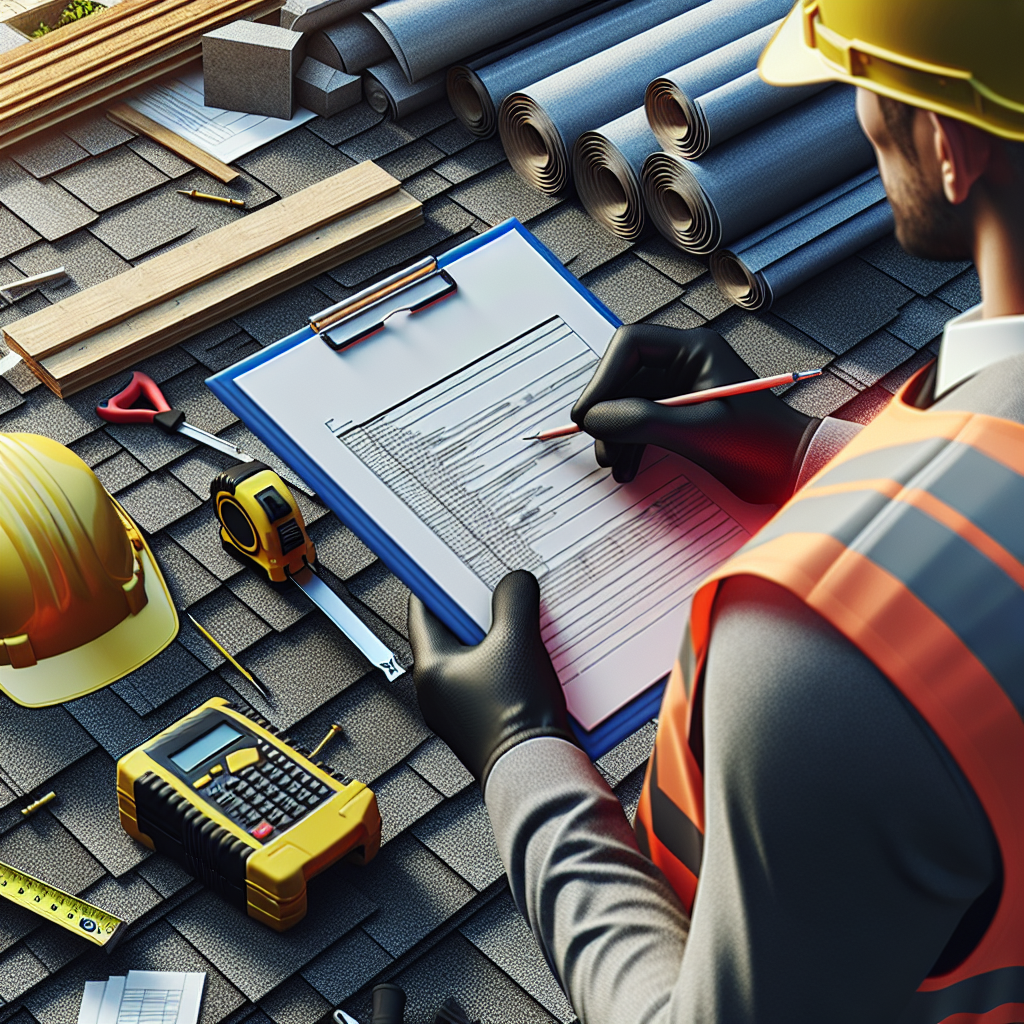When it comes to maintaining the structural integrity of your home, the roof plays a pivotal role. Choosing the right roofing contractor is essential, not just for ensuring the longevity of your roof but also for safeguarding your peace of mind as a homeowner. Whether you’re dealing with a minor repair or a complete roof overhaul, knowing the qualifications and certifications that a reputable contractor should have can save you from a lot of potential headaches. Let’s dive into what makes a roofing professional truly stand out in their field.
Essential Qualifications and Certifications for Roofing Contractors
Finding a qualified roofing contractor isn’t just about picking the most accessible name from a directory. It’s about understanding what certifications and qualifications truly mean in the roofing industry. This includes knowing the difference between compulsory licenses and voluntary certifications that can signify an elevated level of expertise and reliability.
Evaluating Experience and Past Work of Roofing Professionals
Experience in roofing is not just about the number of years on the job. It’s about the diversity and complexity of projects the contractor has handled. Evaluating a contractor’s past work, including before-and-after photos, customer testimonials, and the scope of completed projects, can give you a clear indication of their capability and quality of work.
Understanding Roofing Warranties and Insurance: What Every Homeowner Needs to Know
Roofing warranties and insurance are crucial for protecting your investment. Understanding the nuances of what’s covered under warranty and what’s addressed through the contractor’s insurance can prevent unexpected expenses and complications during the roofing process. Here, it’s key to discern between manufacturer warranties versus workmanship warranties, as each covers different aspects of the roofing job.
Ensuring that your roofing project is in capable hands not only secures the structural integrity of your home but also ensures that it stands as a safeguard for your family and belongings. By being informed about the essential qualifications, evaluating previous work, and understanding the specifics of warranties and insurance, you position yourself as a knowledgeable homeowner ready to make the best decisions for your property.

If you’re ready to take your home improvement or construction project to the next level, we can help! Find trusted contractors on BuildNet, whether you’re looking for renovations, new builds, electrical work, plumbing, or anything in between. Our directory connects you with qualified professionals who can make your vision a reality.
Essential Qualifications and Certifications for Roofing Contractors
Hey there, homeowner! Are you in the process of scouting for a trustworthy roofing contractor? Well, you’re in the right place. Understanding the essential qualifications and certifications a roofing contractor should have can significantly impact the quality and durability of your roofing project. Let’s dive into what makes a roofing contractor stand out in their field!
State Licensing: A Must-Have for Legitimacy
First things first, check if your roofing contractor is licensed. Most states require roofing contractors to be licensed to work legally. Licensing ensures that the contractor has passed certain industry-specific exams and meets the minimum standards for skilled work. This is your first checkmark for a qualified roofer. A licensed contractor not only reassures you of their legality but also their commitment to adhering to local building codes.
Insurance is Non-Negotiable
Always verify that your roofing contractor has worker’s compensation and liability insurance. Why is this crucial? Well, these insurances protect you from being liable in case of accidents or damage to your property during the roofing process. Ask to see the certificates, and perhaps, even call the insurance carrier to confirm validity. This step isn’t just about covering your bases—it’s about ensuring peace of mind.
Professional Certifications: The Mark of Expertise
While state licensing is crucial, professional certifications provide an additional layer of trust and expertise. Certifications from top roofing material manufacturers, like GAF or CertainTeed, mean your roofer has met specific standards set by those manufacturers in installation and workmanship. These certifications often allow contractors to offer better warranties on products and workmanship. Remember, a certified contractor is often a highly knowledgeable one!
Training and Continuous Education: Keeping Up with Trends
Roofing technology and materials evolve. So should your contractor. Continuous education and up-to-date training are signs of a professional who is serious about their craft. Ask potential contractors about their ongoing training processes and how they keep their team efficient and current. This not only ensures a high-quality installation but also introduces the latest roofing materials and techniques suited for your specific needs.
Membership in Professional Bodies
Membership in professional bodies such as the National Roofing Contractors Association (NRCA) can be a significant indicator of reliability and professionalism. These organizations often have strict codes of ethics and standards, which members must adhere to. A contractor involved in these groups is likely to be committed to quality and ongoing professional development.
Local References and Portfolio
A qualified roofing contractor should have a solid track record. Ask for local references and a portfolio of past projects. This not only gives you an idea of their workmanship but also insights into how they manage projects. Take a step further—reach out to these references, visit completed projects if possible, and get a firsthand account of the contractor’s reliability and quality of service. Seeing is believing, after all!
Special Certifications for Specific Needs
If your roofing needs are specialized, like installation of solar tiles or green roofs, look for contractors with specific certifications in those areas. These special certifications can be critical to ensuring your roof is installed correctly and efficiently, maximizing its intended benefits.
Finding the right roofing contractor may feel daunting, but arming yourself with information on the essential qualifications and certifications can simplify your decision. It’s more than just finding a contractor; it’s about partnering with a professional who will safeguard one of your most significant investments—your home. Happy contractor hunting!

Evaluating Experience and Past Work of Roofing Professionals
When it comes to ensuring the safety and longevity of your roof, selecting the right roofing contractor is crucial. But how can you be sure that the professional you choose has the expertise and track record to back up their claims? Here’s where a deep dive into evaluating the experience and past work of roofing professionals comes into play. Let’s explore how you can confidently assess a roofer’s qualifications through their previous projects and experience.
Why Experience Counts in Roofing
Roofing isn’t just about nailing shingles onto a roof; it’s an art that requires precision, understanding of materials, and a firm grasp of local weather conditions. Experienced roofers bring a wealth of knowledge about different roofing techniques, the best materials for certain climates, and potential challenges that might arise during projects. They are typically better equipped to handle unexpected issues, ensuring that your roofing project stays on track and within budget.
Checking Professional Background and Credentials
Begin by examining how long the roofing contractor has been in the business. Longevity can be a testament to the quality and reliability of their work. However, don’t just take years as the only measure:
- Look at their portfolio: A reputable roofer should have a comprehensive portfolio or gallery of completed projects. Review these projects closely and note the variety and complexity of the work.
- References and testimonials: Ask for references and follow up with them. Speaking to past clients can provide insights into the roofer’s quality of work and professionalism.
- Licensing and certification: Ensure the contractor has all necessary local licenses and roofing-specific certifications. These credentials often require passing rigorous exams and staying updated with industry standards, which further validates their expertise.
Assessing Past Projects
When reviewing a roofer’s past projects, pay attention to several key aspects:
- Type of roofing systems installed: Does the contractor have experience with your specific type of roof? Knowledge of various roofing materials (asphalt shingles, metal roofing, tiles, etc.) can be crucial depending on your needs.
- Scale and scope of roofing projects: Look for a variety of projects, both in size and complexity. A contractor who has managed both residential and commercial roofs often has a broader perspective and capability.
- Before and after images: Visual proof of the transformations accomplished by the contractor can not only verify their ability to deliver quality work but also give you a glimpse into their approach and execution.
- Problem-solving examples: Ask potential contractors about specific challenges they’ve faced during past projects and how they resolved them. This can give you insight into their critical thinking and adaptability.
Local Expertise Is a Plus
Choosing a roofer with local experience is invaluable. Local professionals are familiar with building codes and weather conditions in your area and can better prepare your roof to withstand local environmental challenges. Furthermore, a local roofer will have a reputation to uphold within the community, which can often drive higher standards of workmanship.
Using Online Reviews and Ratings
In today’s digital age, online reviews and ratings are indispensable tools for assessing a roofing contractor’s reliability and quality of work. Platforms like BuildNet, Yelp, and Google My Business provide a plethora of reviews that can help you gauge:
- The general sentiment towards the roofer’s services
- Customer service and communication style
- Timeliness and adherence to budgets
- Resolution of issues, if any
However, while reviews are helpful, they should be taken with a grain of salt. Look for patterns rather than isolated complaints or praise. An overwhelmingly positive trend with a few outliers is often a good sign.
Questions to Ask When Meeting Roofing Contractors
When you meet with potential contractors, here are some crucial questions to ask:
- How do you handle unexpected complications?
- Can you provide a detailed written estimate?
- What is your process for disposing of old materials?
- Can you provide examples of similar local projects you have completed?
- What warranties do you offer on your workmanship and the materials used?
By asking these targeted questions, you can better understand not only the roofer’s ability to handle your project but also their transparency and professionalism.
Choosing the right roofing contractor is a decision that influences the long-term durability and effectiveness of your roof. Taking the time to thoroughly vet potential roofers based on their past projects and local expertise will pay off by ensuring that you receive high-quality, reliable work for your home. Remember, a well-maintained roof is not just about aesthetics but protecting your home and enhancing its value.
Understanding Roofing Warranties and Insurance: What Every Homeowner Needs to Know
Hey there, homeowners! Are you contemplating a new roofing project or maybe worried about the existing one over your head? Either way, navigating the complexities of roofing warranties and insurance can be as tricky as walking on a steep, slippery roof! But fear not, I’m here to break it all down for you in an easy-to-understand, friendly chat. Let’s dive into the essentials of what you need to know to ensure you’re as covered as your house!
What Exactly is a Roofing Warranty?
First off, let’s clarify what a roofing warranty generally covers. A roofing warranty is a promise from the roofing manufacturer or contractor to stand behind their product or workmanship. It’s the safety net that makes sure you’re protected in case things go south with the materials or installation. There are two main types:
- Manufacturer’s Warranty: This covers defects in roofing materials. Manufacturers promise that their products will hold up under normal conditions for a certain period.
- Workmanship Warranty: Provided by your roofing contractor, this warranty covers errors in installation or workmanship. If your roof leaks because it wasn’t installed correctly, this is your go-to protection.
Key Elements to Look For in a Roofing Warranty
Not all roofing warranties are created equal! When you’re comparing warranties, keep your eyes peeled for these crucial elements:
Length of Coverage
Duration matters. Most manufacturer warranties cover materials for 20-50 years, often referred to as a “Lifetime” warranty for residential roofs. Workmanship warranties, however, can vary widely from contractor to contractor—ranging from a few years to a lifetime.
What’s Covered (and What’s Not)
Understand the specifics of what is covered. For instance, some warranties only cover material costs, not labor. Also, look out for exclusions like ponding water or cosmetic damage, which might not be covered.
Transferability
If you’re thinking of selling your house, a transferable warranty can be a big plus. This means the warranty benefits can be passed on to the next owner, potentially increasing your home’s market value.
Decoding Roof Insurance: Beyond Warranties
While a good warranty is crucial, insurance plays a pivotal role too. Roofing insurance can safeguard against damages that aren’t covered under warranties, like storm or fire damage. Here’s what you need to understand about roofing insurance:
Homeowner’s Insurance and Roof Coverage
Typically, your homeowner’s insurance covers roof damage caused by unforeseen circumstances such as fire or “acts of God” like tornadoes or hail. However, insurance might not cover issues from wear and tear or poor maintenance. It’s vital to check your policy details or talk to your insurance agent.
Getting the Right Coverage
Make sure your coverage aligns with the value and condition of your roof. If your roof is older, you might face limitations on what your insurance will cover. In some cases, getting additional coverage or riders on your policy for older or high-risk roofs might be a wise choice.
Pro Tips for Maximizing Your Roof’s Warranty and Insurance Protection
- Choose the Right Materials and Contractor: Opt for high-quality materials and a reputable contractor. High-quality installations with excellent materials can maximize both warranty protections and insurance claims success.
- Regular Maintenance: Keep up with regular roof inspections and maintenance. Documenting this care can help in case of a warranty claim or insurance claim.
- Understand the Claims Process: Know the ins and outs of your warranty and insurance claims processes. Quick and appropriate actions can often be the difference between approval and denial in claim situations.
Understanding the nuances of roofing warranties and insurance might not be as exciting as choosing new tiles or shingles, but it’s just as important. Think of it as the unspoken hero that protects your investment in your home. By getting a firm handle on these topics, you’ll not only safeguard your home but also potentially save thousands in unforeseen expenses. Ready to climb up that ladder with confidence? You’ve got this!

What qualifications should a roofing contractor have?
A roofing contractor should ideally have a blend of formal education and hands-on training. Essential qualifications include a high school diploma or equivalent, but many professionals also pursue further education in fields like construction management. Certifications, such as those from the National Roofing Contractors Association (NRCA), can also be invaluable. Make sure your contractor is licensed and insured to operate in your state to ensure both compliance and safety.
How do I check a roofing contractor’s certifications?
Most reputable roofing contractors will be eager to display their certifications. You can ask to see their physical certificates or check their listings on professional bodies’ websites such as the NRCA. Additionally, many states have online portals where you can verify a contractor’s license status.
What experience should a roofing professional have?
Experience is crucial in roofing due to the technical and physical demands of the job. Look for a contractor with a minimum of five years in the industry, as this indicates a solid track record and depth of knowledge in roofing systems and materials.
How do I evaluate a roofing contractor’s past work?
Gauging past work can be done by asking for a portfolio of completed projects. References or testimonials from previous clients can also provide insight into their workmanship and professionalism. Don’t hesitate to visit completed projects if possible, or check online reviews and ratings.
What types of roofing warranties should I look for?
There are typically two types of warranties in roofing: manufacturer warranties that cover materials and workmanship warranties from the contractor covering installation. Ensure your contractor can offer both, and understand the terms and duration of each warranty.
What insurance should a roofing contractor have?
A responsible roofing contractor should have comprehensive liability insurance and worker’s compensation. This protects you from liability in the event of accidents or damage to your property during the project.
How can roofing warranties and insurance save me money in the long run?
While upfront costs might be higher when choosing a well-insured contractor or robust warranties, they can prevent additional expenses due to faults or accidents. These safeguards mean any covered damages or deficiencies are likely to be rectified without additional costs to you.
Conclusion
Choosing the right roofing contractor is not just about finding someone to put a roof over your head. It’s about ensuring long-term protection, efficiency, and peace of mind for your home. With the right qualifications, a proven track record, and comprehensive warranties and insurance, a roofing professional can provide not only a necessary service but also an investment into your home’s future. Remember, the devil is often in the details, such as the quality of materials used, the precision of the workmanship, and the reliability of after-service care.
For homeowners looking to embark on a roofing project, evaluating the qualifications, experience, and the credibility of your contractor will be crucial steps. Take the time to assess past works and speak to former clients. Understand what is covered by warranties and insurance and consider these protections as part of the project’s cost-benefit analysis.
Feeling a bit overwhelmed? Don’t worry! Head over to BuildNet and get in touch with certified and reliable roofing contractors. Whether you’re repairing a damaged roof or installing a brand new one, our professionals are equipped to handle all your needs. Don’t forget to ask for a free quote and start securing your home effectively today!







